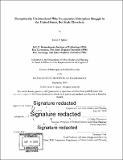| dc.contributor.advisor | J. Phillip Thompson. | en_US |
| dc.contributor.author | Spicer, Jason S. (Jason Simpson) | en_US |
| dc.contributor.other | Massachusetts Institute of Technology. Department of Urban Studies and Planning. | en_US |
| dc.date.accessioned | 2019-02-05T16:00:13Z | |
| dc.date.available | 2019-02-05T16:00:13Z | |
| dc.date.copyright | 2018 | en_US |
| dc.date.issued | 2018 | en_US |
| dc.identifier.uri | http://hdl.handle.net/1721.1/120238 | |
| dc.description | Thesis: Ph. D. in Political Economy, Massachusetts Institute of Technology, Department of Urban Studies and Planning, 2018. | en_US |
| dc.description | Cataloged from PDF version of thesis. | en_US |
| dc.description | Includes bibliographical references (pages 309-339). | en_US |
| dc.description.abstract | In response to record economic inequality and climate change, global actors are turning to alternative institutions to build a just, sustainable "new economy", predicated on "economic democracy". These alternatives include cooperative ownership of enterprise, promoted by social movements, urban/regional planners, and state/national policy entrepreneurs. This strategy is not new, but has repeatedly appeared in periods of crisis. Despite this, little is known about macro socioeconomic or political conditions for success. Do US worker, consumer and producer cooperatives frequently achieve economies of scale? If not, why? This study deploys regression techniques, comparative-historical analysis (CHA), and interview data to answer these questions, synthesizing institutionalism and strategic action fields as a theoretical frame. Large-scale cooperatives are confirmed as less common in the US than other high-income democracies. Accounting for known socioeconomic factors (industry mix, country size/remoteness, social heterogeneity), two political features play a critical role explaining why: the US' liberal market orientation, and its territorially federal structure. Early attempts to develop cooperatives were hindered by the way race-based slavery interacted with US liberalism and federalism, producing a persistently hostile policy environment. As contrasted with "success" cases (Finland, France, and New Zealand) the US has systematically restricted cooperatives from scaling, while enabling competing institutions and fields. The US uniquely lacks a comprehensive national cooperative policy and enabling legislative framework. Cooperative businesses have been limited from accessing public sector economic development tools, including at the state and city scales. The US cooperative ecosystem thus remains weak and incomplete. For US policymakers and planners, the study suggests multi-scalar strategies and incremental policy "layering" might yield practical gains. Practitioners might also benefit from collaboration with complementing organizational types, through the emerging US "community wealth building" policy framework, as has occurred in France's "social and solidarity economy." The study yields at least three significant theoretical and empirical implications: the mix of ownership types is an understudied driver of inequality; combining institutionalism and field theory may enhance theories of institutional evolution and social change; and the spatial configuration of political opportunity structures varies by type of institution, with implications for both urban actors and hybrid-logic organizations like cooperatives. | en_US |
| dc.description.statementofresponsibility | by Jason S. Spicer. | en_US |
| dc.format.extent | 339 pages | en_US |
| dc.language.iso | eng | en_US |
| dc.publisher | Massachusetts Institute of Technology | en_US |
| dc.rights | MIT theses are protected by copyright. They may be viewed, downloaded, or printed from this source but further reproduction or distribution in any format is prohibited without written permission. | en_US |
| dc.rights.uri | http://dspace.mit.edu/handle/1721.1/7582 | en_US |
| dc.subject | Urban Studies and Planning. | en_US |
| dc.title | Exceptionally un-American? why co-operative enterprises struggle in the United States, but scale elsewhere | en_US |
| dc.title.alternative | Why co-operative enterprises struggle in the United States, but scale elsewhere | en_US |
| dc.type | Thesis | en_US |
| dc.description.degree | Ph. D. in Political Economy | en_US |
| dc.contributor.department | Massachusetts Institute of Technology. Department of Urban Studies and Planning | |
| dc.identifier.oclc | 1083126632 | en_US |
